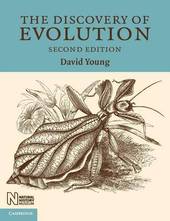
|
The Discovery of Evolution
Paperback / softback
Main Details
| Title |
The Discovery of Evolution
|
| Authors and Contributors |
By (author) David Young
|
| Physical Properties |
| Format:Paperback / softback | | Pages:306 | | Dimensions(mm): Height 246,Width 188 |
|
| ISBN/Barcode |
9780521687461
|
| Classifications | Dewey:576.8 |
|---|
| Audience | | Tertiary Education (US: College) | | General | |
|---|
| Edition |
2nd Revised edition
|
| Illustrations |
16 Plates, color; 7 Halftones, unspecified; 125 Line drawings, unspecified
|
|
Publishing Details |
| Publisher |
Cambridge University Press
|
| Imprint |
Cambridge University Press
|
| Publication Date |
9 August 2007 |
| Publication Country |
United Kingdom
|
Description
Originally published in 2007, The Discovery of Evolution explains what the theory of evolution is all about by providing a historical narrative of discovery. Some of the major puzzles that confront anyone studying living things are discussed and it details how these were solved from an evolutionary perspective. Beginning with the emergence of the early naturalists in the seventeenth century, the scientific discoveries that led up to and then flowed from Darwin and Wallace's theory of evolution by natural selection are then discussed, and finally the modern evolutionary studies at the close of the twentieth century are detailed. This new edition of The Discovery of Evolution is fully updated and contains a new chapter on the evolutionary studies of the twentieth century. By approaching the topic of evolution in this way, it is made accessible to the non-specialist and no previous study of biology is required in order to read and understand this book.
Author Biography
David Young is the Associate Professor in the Department of Zoology at the University of Melbourne, Australia.
Reviews'Young's lavishly-illustrated, well-designed, and clearly-written account of evolution deserves wide general readership, and provides a coherent panorama for students.' Journal of Biological Education 'I recommend this fascinating and well-written book, which will be enjoyed by anyone with an interest in the natural world.' IBIS 'Young's The Discovery of Evolution leads the reader into the deep history of evolutionary ideas, from the 17th century through Darwinism, tracking the contributions of geology, natural history, classification, and genetics along the way. It provides students with a rich background to appreciate contemporary biological ideas and disputes in an accessible and beautifully illustrated book.' Sandra D. Mitchell, Professor and Chair, Department of History and Philosophy of Science, University of Pittsburgh 'The Discovery of Evolution is a superbly accessible, reliable and visually appealing introduction to the history of evolutionary theory. Covering the advances in geology, natural history and palaeontology in the decades before Darwin discovered the principle of natural selection in late 1838, it also examines the obstacles to evolutionist thought in the 1800s, the empirical observations that led Darwin and Wallace to their historic insights, and the brilliant scientific work of the twentieth century that demonstrated the validity of Darwin's evolutionary theory. The book is well-written and presented, but perhaps its chief merit is the sheer quality and quantity of the images which make the ideas it explains so much more comprehensible and the story told richly evocative.' John C. Waller, Department of History and Philosophy of Science, University of Melbourne 'Reading the history of evolutionary biology is one of the best ways to understand what evolution is and what it means for understanding our place in the world. The Discovery of Evolution, beautifully illustrated with contemporary pictures and documents, shows how the theory of evolution provided a single, elegant and convincing answer to a myriad of biological questions. Taking the reader from Aristotle to Darwin to Hamilton and beyond, this book is an accessible introduction to the development of evolutionary biology, and should be read by anyone interested in how this revolutionary idea changed the way we think about the world around us.' Lindell Bromham, School of Botany and Zoology, Australian National University
|